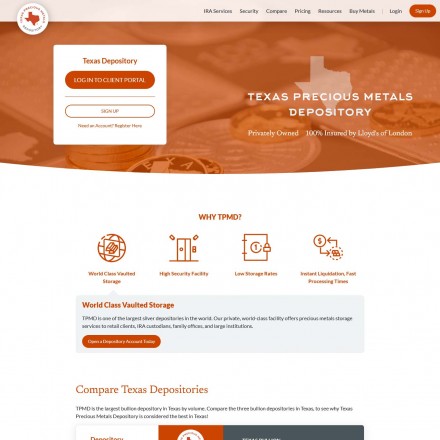United States Secure Storage Facilities
Click US Bullion Depository listings for reviews, information, map & contact details.
Is your bullion depository or storage vault not listed? Add US-based bullion storage facility
Are Over 1600 Bullion Dealers Too Much Choice?
Click here to see our top picks and best rated bullion dealers by category
Showing all 8 results

Texas Bullion Depository
Read More
Texas Depository
Read More
Money Metals Depository
Read More
Dakota Depository
Read More
A-M Global Logistics
Read More
IDS Group
Read More
CNT
Read More
Delaware Depository
Read More
Introduction to United States Secure Storage Facilities
![]() Secure bullion storage facilities (depositories) play a crucial role in the secure storage of precious metals like gold, silver, platinum, and palladium. These specialized facilities offer a safe haven for both individual and institutional investors to store their bullion.
Secure bullion storage facilities (depositories) play a crucial role in the secure storage of precious metals like gold, silver, platinum, and palladium. These specialized facilities offer a safe haven for both individual and institutional investors to store their bullion.
The primary purpose of these depositories is to provide a highly secure environment, safeguarding the physical precious metals from theft, loss, or damage.
By using bullion depositories, investors can ensure the safety and integrity of their investments while also benefiting from the depositories’ expertise in handling and storing precious metals.
Bullion Depository Categories
United States secure storage facilities are categorized into two types: private and government-owned.
- Private Bullion Depositories: These are operated by private entities and cater to individual investors and companies. They offer personalized services, flexible storage options, and often provide additional services like transportation and management of precious metals. Many privae bullion depositories are owned by the bigger national bullion dealers and as such can provide a single source to buy and store metals, making an investor’s job significantly easier.
- Government-Owned Bullion Depositories: These are state-run facilities known for their high security and are often used for national reserves. They offer standardized services with an emphasis on security and regulatory compliance. There is currently only one state-owned depository offering services to private clients, and that is the Texas Bullion Depository.
Each type of depository comes with its unique features, catering to different needs and preferences of investors in terms of security, services, and access to stored bullion.
Using bullion depositories offers several key advantages:
- Security: They provide state-of-the-art security measures to protect precious metals from theft or damage.
- Insurance: Depositories often include insurance coverage, adding an extra layer of protection for your investments.
- Convenience: They handle the storage, security, and sometimes the transportation of bullion, simplifying the investment process.
- Professionalism: Expert handling and management of bullion ensure that your investments are maintained in pristine condition.
- Peace of Mind: Knowing that your valuable assets are securely stored and insured can provide significant peace of mind.
- Compliance: In some situations, having your metals stored in a secure depository is an essential compliance factor, such as when owning physical precious metals inside of an IRA.
Security Measures in Bullion Depositories
Bullion depositories employ advanced security technologies and protocols to ensure the utmost safety of stored assets, including:
- Physical Security Measures: High-grade vaults, 24/7 surveillance, and controlled access points.
- Electronic Security: Sophisticated alarm systems and surveillance technology.
- Personnel Security: Trained security personnel and strict access control.
- Inventory Management: Regular audits and inventory checks.
- Cybersecurity Measures: Protection against digital threats to secure information and transaction data.
These comprehensive security measures collectively provide a robust defense against all forseeable threats, ensuring the safety and integrity of stored bullion.
Costs and Fees Associated with Bullion Storage
The costs associated with bullion storage in depositories typically include storage fees, handling charges, and insurance costs.
Storage fees are generally charged based on the value or weight of the bullion stored. Handling charges may apply for services like transportation, deposit, or withdrawal of bullion. Insurance costs cover the protection of your assets while in storage. These fees can vary depending on the depository’s policies, the type and amount of bullion stored, and the level of services required.
In some instances, fees and storage costs may be fully covered by the dealer selling the metals for storage, especially in the case of gold IRA specialists.
It’s important for investors to carefully review and compare these costs when choosing a bullion depository.
Insurance and Liability
Insurance coverage in bullion depositories typically includes protection against risks like theft, damage, and sometimes even market loss. The extent of coverage can vary, with some policies covering the full market value of the stored assets.
Liability terms, on the other hand, define the depository’s responsibilities and limitations in case of loss or damage. It’s crucial for clients to understand these terms and ensure that the insurance coverage meets their needs.
Selecting a Bullion Depository
 When choosing the right bullion depository, consider factors like location, reputation, services offered, and security measures. All bullion depositories listed in Bullion.Directory are considered among the best in the industry.
When choosing the right bullion depository, consider factors like location, reputation, services offered, and security measures. All bullion depositories listed in Bullion.Directory are considered among the best in the industry.
Additionally, it’s beneficial to look at Bullion.Directory ratings and reviews, which provide insights from other users’ experiences. These ratings can help gauge the depository’s reliability and customer satisfaction. Ensure the depository meets your specific needs in terms of accessibility, insurance coverage, and the types of metals they accept.
As with anything to do with bullion investment, thorough research and comparison are key to making an informed decision.



 Direct Bullion
Direct Bullion The Pure Gold Company
The Pure Gold Company SWP Dubai
SWP Dubai



 Material provided on the Bullion.Directory website is strictly for informational purposes only. The content is developed from sources believed to be providing accurate information. No information on this website is intended as investment, tax or legal advice and must not be relied upon as such. Please consult legal or tax professionals for specific information regarding your individual situation. Precious metals carry risk and investors requiring advice should always consult a properly qualified advisor. Bullion.Directory, it's staff or affiliates do not accept any liability for loss, damages, or loss of profit resulting from readers investment decisions.
Material provided on the Bullion.Directory website is strictly for informational purposes only. The content is developed from sources believed to be providing accurate information. No information on this website is intended as investment, tax or legal advice and must not be relied upon as such. Please consult legal or tax professionals for specific information regarding your individual situation. Precious metals carry risk and investors requiring advice should always consult a properly qualified advisor. Bullion.Directory, it's staff or affiliates do not accept any liability for loss, damages, or loss of profit resulting from readers investment decisions.
